| 1 |
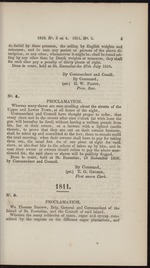 |
“...4.
PROCLAMATION.
Whereas many slaves are seen strolling about the streets of the
Upper and Lower Town, at all hours of the night,
Commandant and Council have thought proper to order, that
every slave met in the streets after nine o’clock (at wich hour the
gun will hereafter be fired) without having a written permit from
his, her or their owner, or a lantern with a lighted candle
therein, to prove that they are out on their owners business,
shall be taken up and committed to the fort, there to remain untill
the next morning, when their owners shall have to pay for taking
them out, the usual fort fee of one piece of eight for each
slave, as also four bits to the schout of taken up by him, and in
case their owner or owners should refuse to pay the above men-
tionend fee, the said slave or slaves will be publicly flogged.
Done in court, held at St. Eustatius, 13 November 1810,
by Commandant and Council.
By Command,
{get.) T. G. Gboebe,
First sworn Clerk.
1811.
N". 5.
PROCLAMATION.
We Thomas...”
|
|
| 2 |
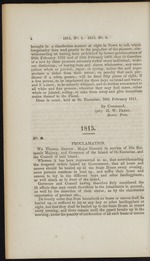 |
“...4
1811. N». 5. 1815. N«. 6.
brought in a clandestine manner at ni^ht in Town to sell, which
irregularity does tend greatly to the prejudice of the planters , not-
withstanding ist having been prohibited by former proclamations of
20th February 1793 and of 10th February 1802 . they do therefore
of a new by these presents sereously forbid every individual, with-
out distinction, of buying from any slaves whatsoever, any canes
(either whole or jointed), sugar, or syrrup, unless the said negro
produce a ticket from their owner, on penalty that such pur-
chaser 'if a white person, will be fined fifty pieces of eight, if
a free person, to be imprisoned for three days on bread and water,
and if a slave, to be severely whipped, and do further recommend to
all white and free presons, wherever they may find canes, either
whole or jointed, selling, to cake them away and give immediate
notice thereof to the Fiscal.
Done in court, held at St. Eustatius, 28th February 1811.
Ey Command,
{get.) H. W. Pandt...”
|
|
| 3 |
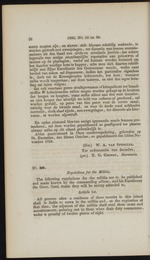 |
“...ordonnantie van denzelve,
(jet.) T. G. Gkoebe, Secretaris.
N°. 30.
Regulations for the Militia.
The following regulations for the militia are to be published
and made known by the commanding officer, and his Excellency
the Govr. Genl. trusts they will be stncty attended to.
Article 1st.
All persons after a residence of three months in this island
shall le liable to serve in the militia and , at the expiration of
th^1 time, the adjutant of the militia shall send them arms and
accoutrements, pointing out to them when their duty commences,
under a penalty of twelve pieces of eight....”
|
|
| 4 |
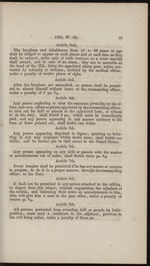 |
“...himself without leave of the commanding officer,
under a penalty of 3 ps. 8/g.
Article 4th.
Any person neglecting to obey the summons given him by his of-
ficer , non-com. officer or person appointed by the commanding officer,
to turn out for drill or parade at the appointed hour, or refuses
to _ do his duty, shall forfeit 3 ps., which must be immediately
paid, and any person appearing in any manner contrary to the
form of dress pointed out, shall forfeit one dollar.
Article 5th.
_ Any person appearing disguised in liquor, speaking or beha-
ving in any way improper whilst under arms, shall forfeit one
dollar, and be further put in civil arrest in the Guard House.
Article 6th.
Any person appearing on any drill or parade with his musket
or accoutrements out of order, shall forfeit three ps. 8/g.
Article 7th.
Every burgher shall be permitted if he has any matter or concern
to propose, to do it in a proper manner, through the commanding
officer, to the Genl.
Article 8th.
It shall not be permitted...”
|
|
| 5 |
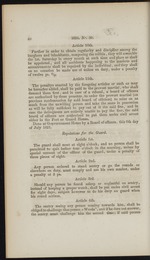 |
“...made use ot unless on duty, under a penalty
of twelve ps. 8/s*
Article 11th.
The penaltys enacted by the foregoing articles or such as may
be hereafter added, shall be paid to the provost martial, who shall
demand them first, and in case of a refusal, a board of of&eera
are authorized by these presehts, to order the provost martial (on
previous condemnation by said board of officiers) to seize on as
much from the unwilling person and take the same in possessio
as will be fully sufficient to pay out of it the said fine. and in
case the delinquents are entirely unable to pay the fine , toe said
board of officers are authorized to put them under civil arrest
either in the Fort or Guard House. . ... ,
Done at Gouvernement House by a Board of officers, this 6 th day
of July 1821.'
Regulations for the Guard.
Article 1st.
The guard shall meet at eight o’clock, and no person shall be
permitted to quit beforè four o’clock in the morning, unless by
special consent of the officer of the guard, under...”
|
|
| 6 |
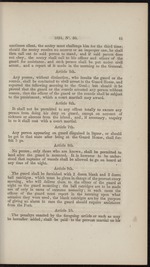 |
“...1824. N*. 30.
41
continues silent, the sentry must challenge him for the third time;
should the sentry receive no answer or an improper one, he shall
then call out to said person to stand, and if said person does
not obey, the sentry shall call to his officer and others of the
guard for assistance, and such person shall be put under civil
arrest, and a report of it made in the morning to the General.
Article 5th.
Any person, without distinction, who insults the guard or the
rounds, shall be conducted to civil arrest in the Guard House, and
reported the following morning to the Genl.; but should it be
proved that the guard or the rounds arrested any person without
reason, then the officer of the guard or the rounds shall be subject
to the punishment, which a court martiall may award.
Article 6th.
It shall not be permitted to any officer totally to excuse any
person from doing his duty on guard, except on account of
sickness or absence from the island, and, if necessary, enquiry
in to it...”
|
|
